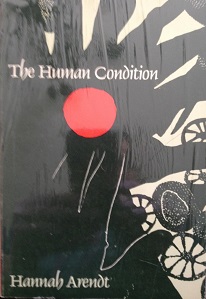File:Totalitarianism in the Age of Trump, Lessons from Hannah Arendt.png: Difference between revisions
Siterunner (talk | contribs) No edit summary |
Siterunner (talk | contribs) No edit summary |
||
| (11 intermediate revisions by the same user not shown) | |||
| Line 1: | Line 1: | ||
<big>'''Hannah Arendt with Lessons for Today'''</big> | |||
:''What are your political acts, and what politics do they serve?'' | |||
:[[File:Hannah Arendt.jpg]] | |||
:<small>* https://www.greenpolicy360.net/w/File:Hannah_Arendt.jpg</small> | |||
:<small>* https://www.theguardian.com/us-news/2017/feb/01/totalitarianism-in-age-donald-trump-lessons-from-hannah-arendt-protests</small> | |||
::[[File:The Human Condition - Hannah Arendt.jpg]] | |||
::The Human Condition | |||
::The University of Chicago Press | |||
::Arendt, Hannah (1970) | |||
:* https://www.greenpolicy360.net/w/File:The_Human_Condition_-_Hannah_Arendt.jpg | |||
:* https://www.amazon.com/Human-Condition-Walgreen-Foundation-Lectures/dp/0226025934/ | |||
:* https://www.amazon.com/stores/Hannah-Arendt/author/B000AQ4I5W | |||
<big>'''''Review: In ‘Vita Activa: The Spirit of Hannah Arendt,’ a Thinker More Relevant Than Ever ''''' </big> | |||
''The German-Jewish philosopher, Johanna "Hannah" Arendt is famous for the phrase "the banality of evil," which she coined after observing the trial of Nazi Holocaust organizer Adolph Eichmann in Jerusalem in 1961. She devoted her life to writing and speaking about human rights, the importance of thought as (as well as in addition to) action, and the nature of power. (IMDB)'' | |||
* https://www.nytimes.com/2016/04/06/movies/vita-activa-the-spirit-of-hannah-arendt-review.html | |||
'' “Vita Activa” includes some especially chilling implications for the current state of American politics. Totalitarianism rested, in Arendt’s view, above all on the systematic refusal to engage reality, on the substitution of ideological fantasy and outright fiction for reason and empiricism. To risk understatement, those tendencies have hardly disappeared from modern society, and may even be stronger than they were at the end of Arendt’s life.'' | |||
~ | |||
[[Category:Anthropocene]] | |||
[[Category:Civil Rights]] | |||
[[Category:Countries]] | |||
[[Category:Democracy]] | |||
[[Category:Digital Rights]] | |||
[[Category:Eco-nomics]] | |||
[[Category:Ecology Studies]] | |||
[[Category:Education]] | |||
[[Category:Election Law]] | |||
[[Category:Europe]] | |||
[[Category:Eurasia]] | |||
[[Category:Germany]] | |||
[[Category:Green Graphics]] | |||
[[Category:Green Politics]] | |||
[[Category:Green Values]] | |||
[[Category:GreenPolicy360]] | |||
[[Category:Human Rights]] | |||
[[Category:Internet]] | |||
[[Category:Media]] | |||
[[Category:Money in Politics]] | |||
[[Category:Networking]] | |||
[[Category:New Definitions of National Security]] | |||
[[Category:Online Education]] | |||
[[Category:Peace]] | |||
[[Category:Planet Citizen]] | |||
[[Category:Planet Citizens]] | |||
[[Category:Social Justice]] | |||
[[Category:Strategic Demands]] | |||
[[Category:US]] | |||
[[Category:Voting]] | |||
[[Category:Voting Rights]] | |||
[[Category:Youth]] | |||
Latest revision as of 15:56, 19 December 2023
Hannah Arendt with Lessons for Today
- What are your political acts, and what politics do they serve?
- The Human Condition
- The University of Chicago Press
- Arendt, Hannah (1970)
Review: In ‘Vita Activa: The Spirit of Hannah Arendt,’ a Thinker More Relevant Than Ever
The German-Jewish philosopher, Johanna "Hannah" Arendt is famous for the phrase "the banality of evil," which she coined after observing the trial of Nazi Holocaust organizer Adolph Eichmann in Jerusalem in 1961. She devoted her life to writing and speaking about human rights, the importance of thought as (as well as in addition to) action, and the nature of power. (IMDB)
“Vita Activa” includes some especially chilling implications for the current state of American politics. Totalitarianism rested, in Arendt’s view, above all on the systematic refusal to engage reality, on the substitution of ideological fantasy and outright fiction for reason and empiricism. To risk understatement, those tendencies have hardly disappeared from modern society, and may even be stronger than they were at the end of Arendt’s life.
~
File history
Click on a date/time to view the file as it appeared at that time.
| Date/Time | Thumbnail | Dimensions | User | Comment | |
|---|---|---|---|---|---|
| current | 17:50, 3 April 2023 |  | 638 × 644 (143 KB) | Siterunner (talk | contribs) |
You cannot overwrite this file.
File usage
The following 3 pages use this file:
- Anthropocene
- Civil Rights
- Countries
- Democracy
- Digital Rights
- Eco-nomics
- Ecology Studies
- Education
- Election Law
- Europe
- Eurasia
- Germany
- Green Graphics
- Green Politics
- Green Values
- GreenPolicy360
- Human Rights
- Internet
- Media
- Money in Politics
- Networking
- New Definitions of National Security
- Online Education
- Peace
- Planet Citizen
- Planet Citizens
- Social Justice
- Strategic Demands
- US
- Voting
- Voting Rights
- Youth

